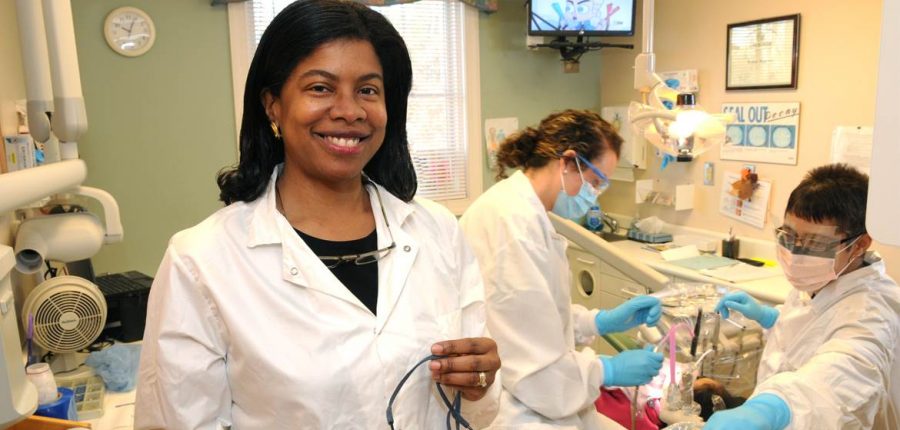Sharon Nicholson Harrell, DDS

As the founding director of FirstHealth Dental Care Centers, Sharon Nicholson Harrell, DDS, is fulfilling a goal she set for herself in undergraduate school: to care for underserved populations. As an AHEC preceptor, she is encouraging future graduates to do the same.
FirstHealth is a regional dental office with three sites established to provide comprehensive dental care for low-income children up to age 18: Southern Pines in Moore County and Raeford in Hoke County (both Southern Regional AHEC counties) and Troy in Montgomery, a Greensboro AHEC county. Because most local practitioners did not take children or Medicaid patients, the largest unmet need among low-income children in the three counties prior to 1997 was dental care, Harrell explained. “There were many kids with nowhere to go.” Local practitioners agreed that FirstHealth should take the lead, and the first site, Southern Pines, opened its doors in October of 1998.
Harrell and her staff precept two to three dental students per year. The students do cleanings, fillings, or restorative care; extractions, patient education, or parent education; and preventive care. “The students get to rotate through several doctors,” she said, “giving them a chance to experience different philosophies.” Harrell limits the number of students she takes at a time in order to spend quality time with each one. “Several students have come back to the area—some to work with us or to work in private practice and fill in here. It’s a win-win for everyone”
Students run the gamut in their range of abilities and comfort level with children, Harrell explained. “Many of those who come to us are not aware of the challenges that lower-income patients face. Two eye-openers for them are patients who don’t have phones and who lack transportation and have to come when others can take them.” These and other challenges drive home the importance of dental education. Harrell added that other staff members are just as critical in providing students with real-world experiences, from learning about practice scheduling from the receptionists to working chair-side with assistants and hygienists.
“We have three goals for our students. One, to increase competency in pediatric dental procedures. Two, to increase speed; in dental school, students spend three hours with one patient. Here, the students see one patient per hour—that’s a three-fold jump. And the third goal is to increase knowledge of public health practice.”
A preceptor since 1992, Harrell has been involved with NC AHEC in a number of ways. Her first encounter was as a young provider taking dental education classes at Southern Regional AHEC in 1991. “I had just come from a residency in Maryland and was impressed that I didn’t have to to far for quality continuing education,” she recalled. She served on the Southern Regional Board of Directors for a three-year term; then, in 2001, she chaired the executive director search committee, which resulted in the selection of Deborah Teasley, PhD, as president and CEO of Southern Regional AHEC.
Harrell’s interest in dentistry started in the tenth grade when she began wearing braces on her teeth. She found the instruments on the tray, the rubber bands, and the entire process fascinating. With the unwavering encouragement and support of her parents, both factory laborers from Rockingham, she entered the University of North Carolina at Chapel Hill with a goal of eventually becoming an orthodontist. But in time she realized her true interest lay in public health and in providing a broader range of procedures to underserved populations. She switched to general dentistry while in dental school at UNC. Harrell also received an MPH from UNC and a certificate in advanced general dentistry from the University of Maryland.
The eldest of three sisters, each of whom are professional women, Harrell credits her parents as being her dominant early influence, as well as the driving force behind her twin values of education and hard work. “When I was coming of age in the ’70s, my father instilled a can-do attitude so that even without a role model in town, I could achieve my goal of becoming a dentist. He taught us that there had never before been so many opportunities open to young African American females—the sky was the limit.” Now a role model herself, Harrell takes that responsibility to heart.
“It’s very important to be role models for kids today so that they can see others doing what they aspire to do. I like the opportunity to expose students to real-world dentistry, and I like teaching. The preceptor role allows me to connect with students. It challenges me and keeps me very current. What keeps me motivated is being able to see the progression of students who are more prepared when they enter the real world. We enjoy playing a role in making future graduates feel comfortable in taking care of pediatric patients. We hope their exposure to underserved populations will make them more accepting in their own offices.”
